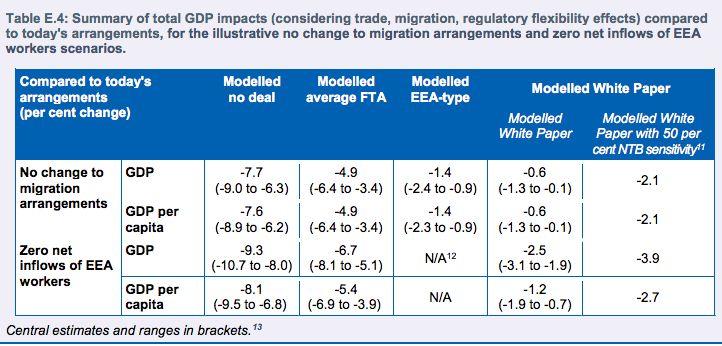UK economy will be worse off under every Brexit scenario, government’s own analysis confirms
The UK economy could take a 3.9 percent growth hit under a deal that resembles Theresa May's Brexit plan, the government has said.
A report published on Wednesday morning argues that life outside the EU will leave the UK poorer than if it had stayed inside the bloc in a range of scenarios over the next 15 years.
A no-deal Brexit would cause the greatest economic hit, with GDP up to 10.7 percent smaller than it would have been if the UK had stayed in the EU, while a free trade agreement could see an 8.1 percent hit.
The draft future relationship with the EU agreed on Sunday was not analysed for the impact on the UK economy, but an examination of a looser Chequers agreement-style deal warned that GDP would take a 3.9 percent hit.
If the Chequers agreement was implemented, which would see frictionless trade on goods and agri-foods, the economy would grow by around 2.5 per cent less.
Speaking in the Commons just minutes after the Brexit department published the report, May said the numbers supported her negotiating strategy.
She said: "The analysis does not show that will be poorer than the status quo today, what the analysis shows is that this is a strong economy that will continue to grow and that the model which actually delivers best on delivering for the vote of the British people and for our jobs and our economy is the model that the government has put forward, is the deal that the government is proposing.”

May claims government data shows her Brexit deal is the best option (Source: The Department for Exiting the EU)
Appearing on the BBC on Wednesday morning, chancellor Philip Hammond was asked if the UK would be poorer under every Brexit scenario. He replied: “Yes you are right in that analysis.”
He added: “If you look at this purely from an economic point of view there will be a cost to leaving the European Union because there will be impediments to our trade.”
Speaking ahead of the report being published, former Brexit minister Steve Baker said: “The reputation of government economics is in the gutter. That must change. It’s time for the chancellor to publish all his assumptions and full model documentation so we can begin the process of recovery.”